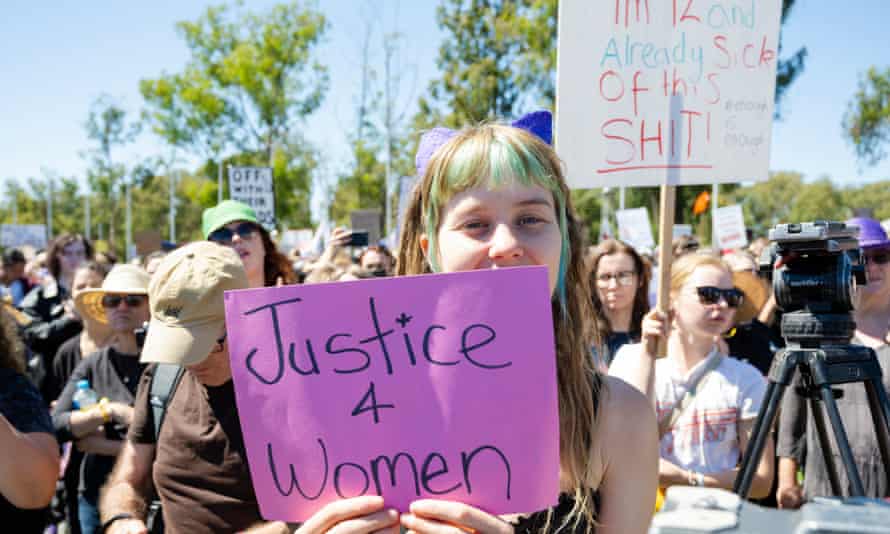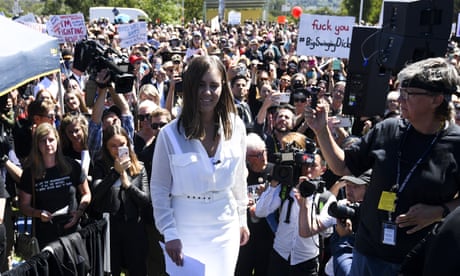Extract from The Guardian
Behind
the noisy women in the streets are others watching how small the prime
minister has been in a moment when he needed to be big

Last modified on Mon 15 Mar 2021 23.45 AEDT
It was a sea of black outside the parliament, with a sprinkling of masks and a smattering of hot pink pussy hats – a human sea tumbling down the forecourt back towards the old parliament.
But Brittany Higgins wasn’t cloaked in black. The former Liberal staffer, tracking towards the stage, quietly, without fuss, wore suffragette white.
Having arrived, Higgins sheltered, waiting for her moment like an idling Exocet.
In some strange quirk of fate, or perhaps circle of life, Higgins stood close to the spot where Tony Abbott had mounted a stage festooned by Ditch the Witch and Juliar Bob Brown’s Bitch placards back in June 2011. It was a different crowd on Monday, a crowd decoupled from that unhinged rage against Julia Gillard, perhaps even radicalised by it.
Controlled fury was Monday’s glue, the secret handshake, the wink and the nod. But the atmosphere wasn’t grim. Not funereal. Not vengeful.
The crowd in Canberra brimmed with hope about what could be different if the men holed up in the people’s house found the grace to stop calculating and start listening. Labor’s Senate leader, Penny Wong, at one point belted out I Am Woman – a subversive gesture capturing the spirit of audacious optimism.
Optimism was the convection current that lifted Higgins from her idling place offstage. She transited from the comfort of the squad of women huddled protectively around her to Canberra’s brutal autumn sun, shoulders squared, chin raised, balled tissue in a clenched fist.
The young woman made her way to the microphone. “I speak to you today out of necessity,” Higgins said. “We are all here today not because we want to be here – because we have to be here.”
Speaking in reference to her own allegation and the way it has been handled by her former employers, Higgins said silence was complicity. “I was raped inside parliament house by a colleague, and for so long it felt like the people around me did not care about what happened because of what it might mean for them.”
Morrison can’t seem to grasp (to borrow from Higgins) that this isn’t a political problem, it is a human problem
“It was so confusing because these people were my idols. I had dedicated my life to them. They were my social network, colleagues and my family – and suddenly they treated me differently.”
After the violation she says she endured on a couch in the parliament in March 2019, there were the men who assumed her partner was the brains behind the weaponisation of her story; and the advocates “on the macro level” who disappeared “when the issue hit too close to home at the micro level”. Higgin’s allegation is the subject of an ongoing police investigation and no charges have yet been laid.
If rape, and silencing, and manifest disdain could happen to her, a young woman of connections and resources, in this place – the parliament of Australia – it could happen to anyone. If democratically elected officials weren’t committed to dealing with alleged abuses of power in their own offices, “what confidence can the women of Australia have that they will be proactive in addressing this issue in the broader community?”
Higgins implored the sea of black, now boiling with her call to action, to “take ownership of your story and free yourself from the stigma of shame”.
“Together, we can bring about real, meaningful reform to the workplace culture inside Parliament House – and, hopefully, every workplace, to ensure the next generation of women can benefit from a safer and more equitable Australia.”
The cause was so evidently just, Higgins’ words so economical and precise, that aftershocks were felt in the parliament.
The powerful men holed up in their bunker, the great men of politics who have fumbled this crisis so comprehensively at every turn – men like Australia’s prime minister, who don’t seem to understand that the moment is calling them to manage their own crisis of institutional legitimacy – continued being hapless.
Scott Morrison didn’t want to come out to meet the women, and then sounded miffed when they declined to meet him privately in his office.
At one point in the parliament, Morrison spoke as though he thought the women of Australia should be grateful for having the right to protest without being killed. Protests like Monday’s were a triumph of democracy because “not far from here, such marches, even now, are being met with bullets”.
It is unfathomable how a moment so big can be met with a response so small.
Perhaps Morrison consoles himself by thinking these angry women, with their earnest references about intersectional feminism, are not his crowd, they not the Coalition’s people, that it’s different in the suburbs.
Perhaps he thinks this whole inconvenient distemper will burn itself out if he just remains inert, doesn’t read, doesn’t listen, doesn’t engage.
What the prime minister doesn’t seem to understand is standing behind the noisy women are more women who won’t take to the streets with a placard but are nonetheless watching how small Morrison has been in a moment when he needed to be big.
I don’t know why the prime minister so comprehensively doesn’t get it, but Morrison can’t seem to grasp (to borrow from Higgins) that this isn’t a political problem, it is a human problem; that the moment calls for humanism not for strategy.
As I watched an hour or two in modern political history I won’t forget, as the black sea boiled on the parliamentary forecourt on a March Monday, I wondered which of the placards might find its way in time to the archival collection of the parliament.
The Australian parliament, in a quiet corner, harbours the glorious banner painted by suffragette Dora Meeson. Meeson’s banner, intended to shake and shame another complacent political class into inclusivity more than a century ago, reads: “Trust the Women Mother As I Have Done.”
I scanned the banners in the crowd, trying to spot the placard from 2021 that might ultimately join Meeson’s.
Would it be: “He said, she dead”? Would it be: “Toxic Masculinity is Killing Us?”
It took a me few minutes but, eventually, I found the mantra of the moment in the hand of a defiant preteen. “I’m 12, and I’m Already Sick of this Shit.”

No comments:
Post a Comment